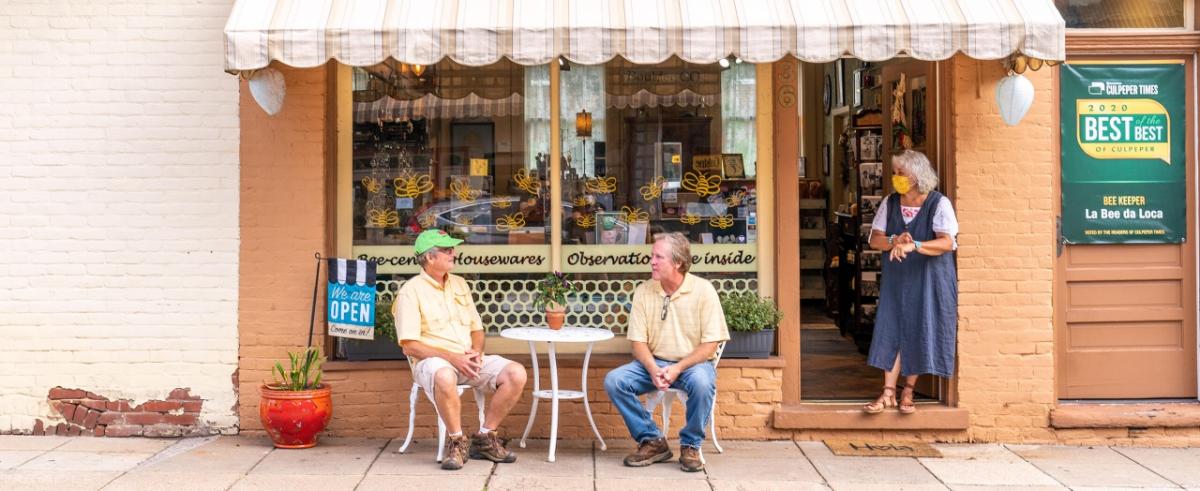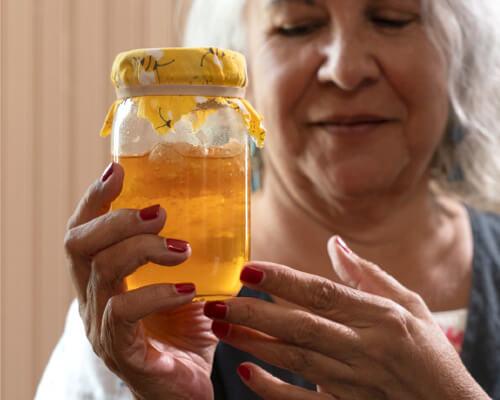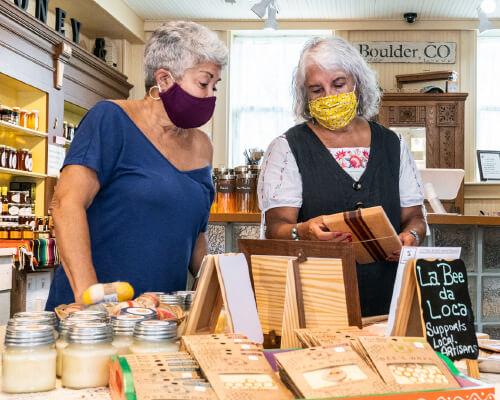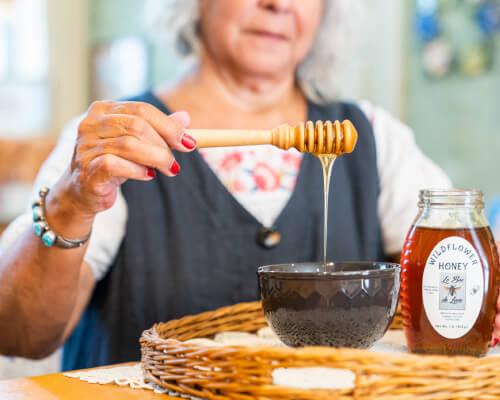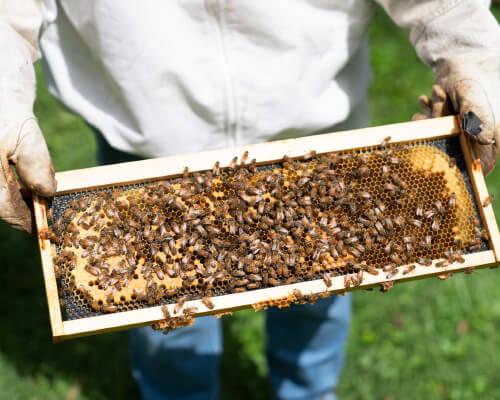Sweet Relief: A Small-Business Owner Gets Back on Her Feet
As small businesses suffer the economic impact of COVID-19, Truist and community partner LISC are working to bring resources to rural towns.
Culpeper, Virginia, resident beekeeper and small-business owner Felecia Chavez has had a difficult year. Her business lost 90% of its revenue. She couldn’t pay her employees. Her landlord raised her rent. And she contracted COVID-19.
For a woman who has dedicated her life to helping others, this time Chavez was the one struggling. But with the help of a Truist Cares* grant, her small business and others like it are getting the support they need.
Chavez spent over 30 years of her life heading into war zones for the American Red Cross, helping active-duty soldiers cope with the traumas of war.
“We provided a safe environment to come and talk,” says Chavez. “If there was a death in the family back home, or the birth of a child, we would help. Sometimes, a soldier would contact [their] spouse and say, ‘I’ve had it. I just can’t do this anymore.’ We made sure the soldiers got the help they needed.”In 2014, after decades of taxing work, Chavez retired, but her transition back to civilian life proved difficult.
The thing that got her through? Bees.“I remember the first time I popped the top and grabbed the frame [of the hive],” says Chavez. “I could feel the energy coming through my fingers. It was a feeling of being part of that hive. It was the ‘aha’ moment for me, ‘This is what I was meant to do.’”
New purpose, new business
In 2015, Chavez launched her business, La Bee da Loca, in a charming retail storefront in historic downtown Culpeper. La Bee da Loca sells handmade crafts, beekeeping equipment, and of course, honey
But what’s most important to Chavez has been the opportunity to share the power of bees with her community, which is why she installed an active observation hive on the second floor of her shop.
When Chavez opened La Bee da Loca, schoolteachers started bringing in students by the busload. Then, parents started visiting on their own. Over the years, thousands of people have traveled from near and far to learn from Chavez and her bees.
“It gives me so much joy to talk about how important bees are and what they provide,” she says. “It has started a whole community dialogue. The shop is really built around this observation hive.”
But then came the COVID-19 pandemic, prompting 24%† of U.S. small businesses to temporarily close by April.
Small-business struggles
In March, Chavez had no choice but to close her shop and lay off her three part-time employees. She began to worry as her expenses ate through her savings. And then in July, she contracted COVID-19.
“When they told me I was positive,” she says, “I was like, ‘What do I do? How do I make sure that I’m going to be OK? Because we don’t know what it is.’”
While Chavez was recovering, her employees stayed the course, even when she couldn’t pay them.
Chavez says through tears, “It’s people like that who make my shop what it is. That’s what community is all about.”
Chavez wasn’t eligible for a PPP (Paycheck Protection Program) loan, and her employees weren’t eligible for unemployment. That’s when she found a grant opportunity through Local Initiatives Support Corporation (LISC) and their small-business COVID-19 relief fund.
Relief through a local partnership
Since 1979, LISC has used its strong local partnerships to connect communities and small businesses with the resources they need. The nonprofit has infused more than $905 million into local economies nationwide.
A Truist Cares* grant of $2 million to LISC helped female and minority small-business owners like Chavez during the pandemic.
A July 2020 report by the National Bureau of Economic Research revealed that the number of active business owners in the U.S. fell by 3.3 million between February and April, with Latinx business owner activity dropping by 32% and female business owner activity by 25%.
“It is important that we not only ease the strain of COVID-19 but also invest in the lasting economic infrastructure of our communities,” says Maurice A. Jones, LISC president and CEO. “That’s why we are working to fuel local businesses that create jobs and produce vital goods and services for residents. All of that will catalyze new opportunities throughout America for many years to come.”
“The pandemic caused many small-business owners to experience extreme financial strain,” said Dan O’Neill, East Virginia regional president at Truist. “As part of our response to COVID-19 needs through the Truist Cares* initiative, the $2 million grant to LISC has provided financial relief to 200 small businesses throughout the country, helping them with rent, employee payroll, and reopening shops that were forced to close their doors.”
La Bee da Loca itself received $10,000, which allowed Chavez to catch up on her rent, bring back her employees, and reopen the shop — all while recovering from the virus.
“It’s had a huge impact,” says Chavez. “If I hadn’t gotten this grant, I don’t know what would have happened.”
Now back on her feet, Chavez started a curbside service for her honey. She says her sales numbers are coming back up as people from nearby cities like Washington, D.C., Richmond, and Charlottesville drive in to visit La Bee da Loca and get away from the city.
“My bees are happy,” she says. “They’re doing so well during this time of COVID. It’s the best harvest year we’ve had. They are what’s healed me, just being around something so small, yet so powerful.”
Truist is proud to be a part of resilient communities that motivate us to build better lives every day. Seeing how our community partners have stepped up in the face of COVID-19 inspired us to form the Truist Cares* initiative, a $50 million commitment to help support youth, seniors, the workforce, small businesses, and increased connectivity. For more stories about the work our partners are doing, visit truist.com/truistcares.
*About Truist Cares: Truist Cares is a cooperative effort between Truist Financial Corporation, Truist Foundation, Inc., and Truist Charitable Fund to provide communities, organizations and individuals disaster relief and assistance during the COVID-19 crisis.† Metlife & U.S. Chamber of Commerce
About Truist
Truist Financial Corporation is a purpose-driven financial services company committed to inspire and build better lives and communities. With 275 years of combined BB&T and SunTrust history, Truist serves approximately 12 million households with leading market share in many high-growth markets in the country. The company offers a wide range of services including retail, small business and commercial banking; asset management; capital markets; commercial real estate; corporate and institutional banking; insurance; mortgage; payments; specialized lending; and wealth management. Headquartered in Charlotte, North Carolina, Truist is the sixth-largest commercial bank in the U.S. with total assets of $504 billion as of June 30, 2020. Truist Bank, Member FDIC. Learn more at Truist.com.

